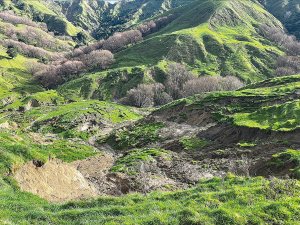Six months on from Cyclone Gabrielle, a farming leader says the so called ‘recovery’ is almost non-existent.
Farmer and Federated Farmers board member Toby Williams – whose property is just out of Gisborne – says despite the efforts of individuals, there are many ongoing factors that have made recovery nigh impossible. He believes it may take a decade before he and other farmers are back to where they were before the series of adverse events which have plagued the East Coast region for the past four years.
Williams says after Gabrielle they were hit by another storm, which actually did more damage. In his case, Cyclone Hale also caused more damage.
“It’s just been relentless. We’ve lost fences and a heap of ground and there have been a number of small slips, some of which have had to be cleared multiple times,” he told Rural News.
“We had a digger in, but they had to stop work because it was too wet and dangerous for them to operate.”
Williams adds that a lack of fencing is a massive problem. He and others have had to make temporary repairs to fences using iron stakes and netting to hold their farms together until permanent repairs can be made. But Williams says the concept of set stocking has gone and he’s had to revert to what he calls ‘block stocking’.
“This means that instead of putting four mobs of 100 sheep in four separate paddocks, I’m forced to put the whole 400 in one paddock because I can’t repair the other fences.”
Williams runs 13,000 stock units on his 1500-hectare farm and says livestock condition is good, although with the cold, wet winter, feed is starting to get tight.
Six months on, access for farmers and to farms remains an ongoing problem. However, he says having the temporary bridges in place has made a difference.
Williams says while the Government has been forthcoming with finance to help farmers, there shouldn’t be an expectation that every time there is a major weather event the Government will bail out farmers.
He says the reality is that climate change is here to stay and farmers have to adapt to this.
The Challenging Outlook
Williams says with the massive impact of climate change and the present economic crisis, farmers everywhere, including Tairawhiti, need to take a hard look at their businesses to see what changes they need to make to remain viable.
He says for some in hill country regions it may mean farmers not finishing their stock as they have traditionally done, which in some cases is barely profitable.
Williams believes there needs to be a mindset shift and some hard conversations with financial advisors, accountants, banks and other farmers to come up with solutions. “This is a good opportunity to sit back and say, ‘I can’t continue doing what I am doing now, so what do I do?’” he explains. “Maybe I need to think outside the square and do some things differently to stay viable in the future.”
Williams says he’s had to wipe $150,000 from his budget because of the slump in lamb prices. He was budgeting on getting $160 each for his ewes, but this now looks more like $98.
“We are going into protection mode now because things are really tough,” he told Rural News.
“Interest rates are crippling – with mortgage rates over 8% and the rate for working capital over 11%. Out costs are up by 30%, fertiliser has doubled in price, fuel prices have risen, and shearing costs have gone up by between 40% and 50%. What me and other farmers are saying, is there some way we can generate additional income off the farm.”
Williams believes the present situation may be temporary, noting that many analysts are saying the situation will improve over the next six months.
However, he says farmers are price takers and this means they can’t demand an extra dollar from a processing company or dairy factory to make ends meet.
Williams says this and the impacts of climate change makes farmers vulnerable and unless there is an improvement in commodity prices, some farmers won’t survive.











